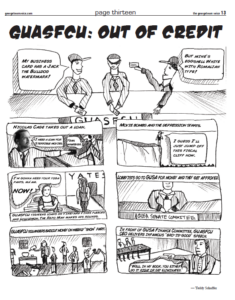With the passing of the one year anniversary of Occupy Wall Street inevitably come pronouncements on the significance and relevance of the movement. Conservatives have forcefully condemned it to what one famous Bolshevik once termed the “dustbin of history,” while sympathetic liberals have celebrated it for reintroducing economic inequality back into American political discourse.
As for the radical utopians at the front lines in Manhattan, Oakland, and elsewhere deciding on the movement’s next steps, the future remains hazy—will OWS go the way of the seemingly directionless, increasingly apolitical Indignados of Spain, or might it somehow regain popular momentum and come to resemble something like the mass mobilizations of Quebecois students?
This kind of idle speculation is ultimately fruitless; it’s better left to the pundits who haven’t set foot in Zuccotti and have by now already refocused their attention to the vapid horse races of the election season. But if there’s one thing that Occupy has unambiguously exposed at this point—and reminded us of again on Monday—it’s the sheer power and role of the police in our society.
On Occupy’s anniversary day, more than 180 people were arrested on a peaceful march in lower Manhattan. Police reportedly yanked demonstrators from the sidewalks, detaining elderly folks and people in wheelchairs. Several journalists were arrested and a New York City councilman was assaulted by a police officer in Zuccotti Park. This puts the total arrest count for Occupy protests nationwide at around 7,600.
But there is something valuable in this madness. A common chant hurled at aggressive cops at protests is, “Who do you protect? Who do you serve?” Of course, those who ask already know the answer. This interaction between police and demonstrators—and the repression that often accompanies it —reminds us to whom the law is ultimately accountable. It puts into concrete terms what is an abstract notion: that the police are there to protect the interests of the rich and powerful, that there’s one set of rules for the wealthy and another set governing the rest of us.
This familiar interaction repeated itself on Monday. While the supposed “rule of law” doesn’t apply to the banks that committed securities fraud on a massive scale, or the Wall St. executives who perjured themselves before the Senate, it does to skinny 17-year-old kids with anarchist flags who try to sit down in front of the entrance to the New York Stock Exchange. And each time the New York Police Department pummels protesters to the ground under the pretext of protecting those cozy office buildings of our financial overlords—Goldman Sachs, J.P. Morgan Chase or Deutsche Bank—we’re reminded of the immunity of the banks and the great lengths the state goes to guarantee that immunity. It’s no surprise police repression played such a pivotal role in spreading Occupy last fall. For exposing the priorities and interests of the state so clearly, the movement is of tremendous importance.
Contrary to what some well-intentioned skeptics sometimes assert, the police repression of Occupy isn’t simply a series of isolated police departments carrying out the “rule of law” by confronting civil disobedience. It’s long been established that mayors coordinated a crackdown on their cities’ encampments last November. We also know the trail goes much higher. Thanks to documents obtained by various Freedom of Information Act requests, we’ve learned that the Department of Homeland Security’s National Operations Center was intimately involved in monitoring the movement. DHS was even in direct contact with the White House about how to deny its involvement in monitoring the protests.
Still, it’s difficult to fully grasp what the police surveillance that Occupy has generated actually means. Either the state is genuinely afraid of a popular movement taking shape—which many thought back in OWS’s glory days last fall—or, perhaps even more disturbingly, law enforcement simply has such an expansive set of resources at its disposal to crush any counterculture movement it deems an inconvenience to larger society, especially the ruling one percent.
No matter what, the fact that Occupy has laid bare the vicious tactics of the police state and led millions to contemplate its consequences is a legitimate and lasting victory in itself.
Tell Cole how you’d Occupy him at cstangler@georgetownvoice.com.




